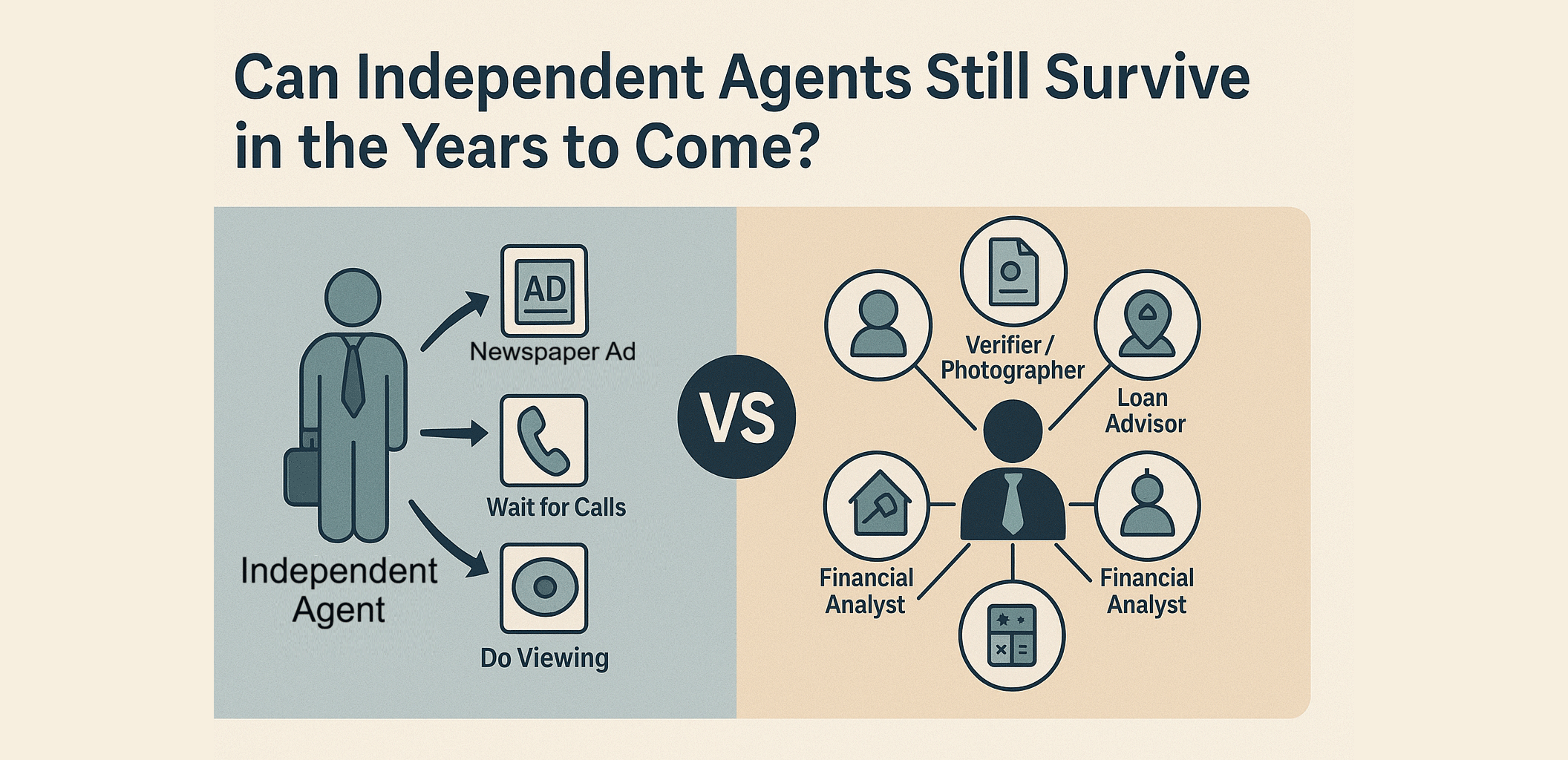Can Independent Agents Still Survive in the Years to Come?

There was a time when real estate was simple. You listed a property, ran a newspaper ad, waited for calls, and closed the deal.
That was the golden age of independent agents — when experience and relationships were enough.
But the market has evolved. Today’s agents operate in a far more complex environment — defined by data, digital visibility, compliance, and client expectations that look nothing like they did twenty years ago.
The question is: can independent agents still survive in the years to come?
1. From Simple Transactions to Complex Operations
In the past, the formula for success was straightforward:
Get listings → advertise → show → close.
Now, it’s a multi-layered ecosystem where one person must juggle ten professions at once.
A modern property agent is expected to act as:
- Digital Marketer – runs Facebook, TikTok, and Google ads effectively.
- Content Creator – shoots videos, edits photos, and crafts viral captions.
- Copywriter – writes persuasive, SEO-friendly property listings.
- Photographer/Videographer – captures professional visuals that sell.
- Negotiator – handles buyer-seller psychology under pressure.
- Loan Advisor – interprets bank policies, DSR, and loan eligibility.
- Legal Coordinator – understands SPA, tenancy agreements, and stamp duty processes.
- Financial Analyst – calculates yield, ROI, and investment break-even points.
- After-Sales Manager – ensures smooth handover, defects, and rental setup.
- CRM Operator – tracks hundreds of leads and follow-ups across channels.
Each one of these roles takes time, skill, and consistency — and the truth is, no one person can master all of them simultaneously.
That’s why the classic lone-agent model is collapsing under modern demands.
2. The Rise of Structured Teams and Systems
Large teams and digital-first agencies have turned real estate into a precision business. They use shared CRMs, verified databases, lead automation, and real-time co-broking dashboards.
Instead of one agent doing everything manually, these systems distribute tasks across roles — enabling speed, consistency, and scale.
An independent agent trying to compete with that structure is essentially fighting an army with a phone.
What used to be a personal business is now a systemised enterprise.
3. Why the Old Independents Still Survive
That said, not all independents are struggling.
Veteran agents who entered the market decades ago continue to survive — even thrive — because they built their base before the systemised era began.
They already have:
- Repeat clients who buy, sell, and rent through them regularly.
- Strong local networks with landlords and developers.
- Trust-based referrals that keep new leads flowing.
They no longer need to advertise aggressively — their reputation is the funnel.
For these veterans, independence still works because they’re living off a pipeline they built over years of credibility.
4. Why New Independents Will Struggle
For new agents starting fresh, independence now feels like isolation.
Without a support system, they must compete against agencies with:
- Paid lead funnels,
- Dedicated marketing teams,
- Social media automation,
- Centralised co-broking databases,
- Admin staff who handle paperwork.
By contrast, a new independent must:
- Source their own listings,
- Qualify buyers manually,
- Write every caption,
- Pay for every ad,
- And still attend every viewing personally.
It’s not about ability — it’s about capacity.
Even if they work harder, the math doesn’t scale. They simply can’t multiply themselves fast enough to keep up with structured competition.
5. The Turning Point — ListingMine’s Role-Based ACN
This is exactly where ListingMine’s Agent Cooperation Network (ACN) comes in.
It introduces a role-based co-broking system, inspired by how the best-performing agencies in China (like Beike’s ACN model) operate.
Instead of one agent handling the entire process, ACN breaks the transaction into specialised, event-verifiable roles.
Typical roles include:
- Listing Input Agent – uploads and maintains verified unit data.
- Verifier/Photographer – validates photos, floor plans, and on-site accuracy.
- Docs Collector – secures SPA, tenancy, and ownership authorisations.
- Buyer Referrer – introduces and registers a qualified buyer or tenant.
- Viewing Agent – conducts physical viewings and feedback.
- Closer – negotiates and finalises the offer.
- Finance Advisor – assists with loan approval and bank coordination.
- Transaction/Legal Advisor – coordinates signing, stamping, and handover.
Each role earns a share of the commission, automatically tracked by the system.
No disputes. No guesswork. No duplicated effort.
Agents simply do what they’re best at — and get paid fairly for that contribution.
6. Why Role-Based Co-Broking Is the Future
This model mirrors how modern industries evolve — from generalists to specialists.
In a role-based ecosystem:
- The best photographers don’t need to chase buyers — they just verify listings.
- Strong closers can focus purely on negotiations.
- Loan and legal specialists add value at the right stage.
Every task is traceable, timestamped, and rewarded transparently.
It’s still independent work — but with a collaborative backbone.
For agents, this means keeping their freedom while operating at enterprise-level efficiency.
7. The Bottom Line
Independent agents can still survive — but not by working alone.
The future belongs to agents who:
- Focus on their strengths,
- Collaborate transparently,
- Leverage verified systems, and
- Let technology handle coordination and compliance.
ListingMine’s ACN model gives independents a way to stay free yet scalable — turning isolated effort into interconnected strength.
Because in modern real estate, success doesn’t come from doing everything yourself — it comes from doing your part better than anyone else.











































































































